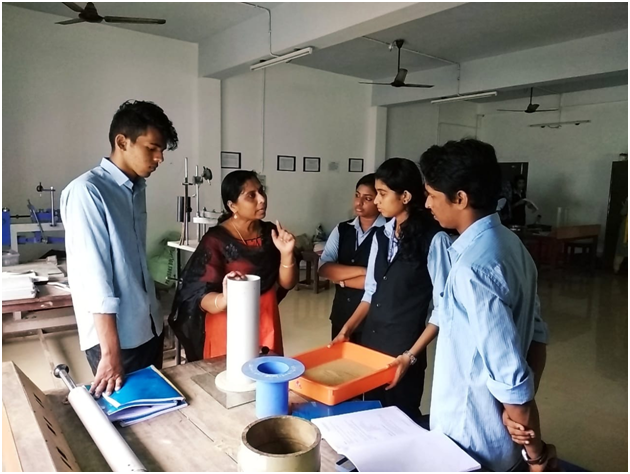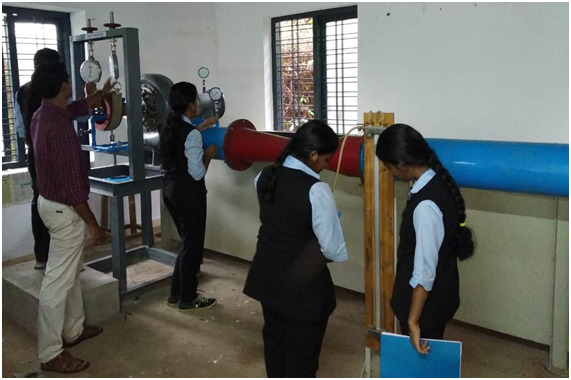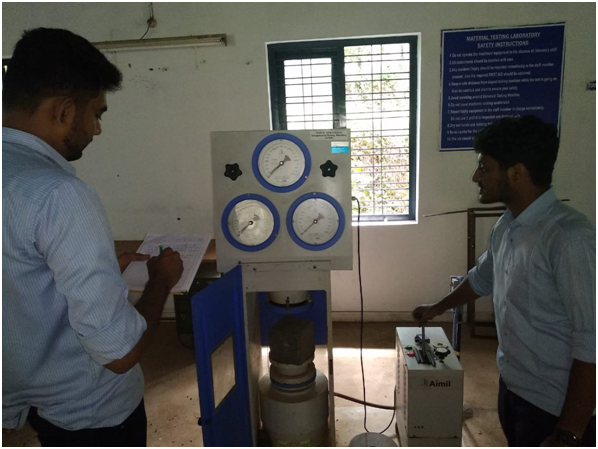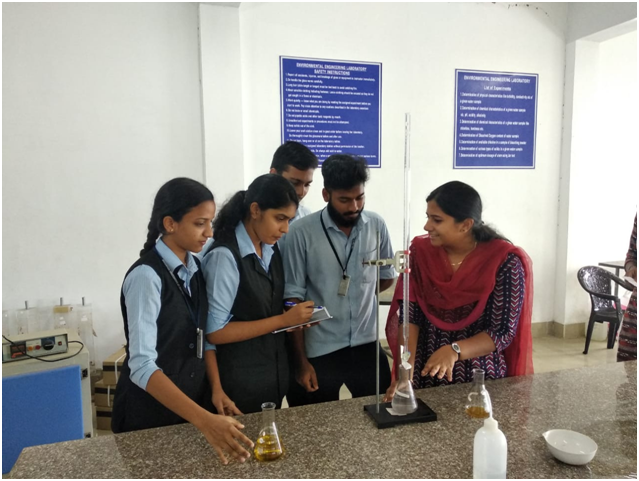- About Us
- Academics
- Research
- Facilities
-
Peoples
- Department of Civil Engineering
- Department of Computer Science and Engineering
- Department of Electrical and Electronics Engineering
- Department of Electronics and Communication Engineering
- Department of Electronics and Instrumentation Engineering
- Department of Information Technology
- Department of Applied Science and Humanities
- Administration
- Students Corner
- Placements
- IQAC
- Gallery
- NSS
- TEQIP
Lab Facilities
1.TRANSPORTATION ENGINEERING LABORATORY

The Transportation Engineering Laboratory is equipped with facilities for testing of Aggregates and Bitumen. The Laboratory is fully equipped for conduct regular experiments at UG level, consultancy works and research activities.
The laboratory is facilitated with ring and ball apparatus, Aggregate impact testing machine, shape test apparatus, ductility testing machine, Standard tar viscometer, Los Angeles Abrasion testing machine, Flash and fire point apparatus, Universal penetrometer, Marshall stability apparatus etc.
2.GEO-TECHNICAL ENGINEERING LABORATORY

It is well equipped with instruments and machineries for conducting laboratory tests and undergraduate students are being encouraged to do research in the field of geotechnical engineering by making use of facilities available.
The equipments in the geotechnical lab is used to determine the physical properties, strength, compressibility and permeability of soil.
The laboratory is equipped with Field density testing apparatus, Permeability testing apparatus, CBR testing apparatus, Consolidation testing apparatus, Direct shear test apparatus, Atterberg Limits testing apparatus, Soil Hydrometer , proctor compaction testing apparatus etc.
Consultancy work from the government, semi government and private agencies are undertaken. Soil investigation for various projects in Kottayam district is conducted in Geotechnical Engineering lab
3.FLUID MECHANICS AND HYDRAULIC MACHINES LAB

The activities in this laboratory are focused on the physical understanding, modeling and manipulation of flows and their instabilities.
The main objective of this laboratory is that, student should be able to verify the principles studied in theory by conducting the experiments.
The laboratory is facilitated with pipe friction apparatus, Bernoullis apparatus, Pelton turbine, Francis turbine, Venturimeter and orifice meter, Keplan turbine , notch apparatus etc.
4.SURVEY LAB

Here practical lessons on surveying theory are provided. Starting from the old metric chains to latest total station are provided in the lab. The various instruments/equipments include plane table, automatic level, prismatic compass, theodolite,electronic theodolite,GPS , Total Station etc.
5.MATERIALS TESTING LAB

This lab is well equipped for testing structural materials including steel, timber, concrete etc., and has a 40 T UTM, 100 T and 200 T compression testing machine, Double shear test apparatus, Impact testing machine, tortion testing machine etc. Standard tests are routinely performed for Government and Private Organizations.
6.CONCRETE LAB
This lab provides facilities for various tests for cement and concrete which includes test for compressive strength, flexural strength, fineness, and mix design of concrete etc
This laboratory is actively involved in consultancy work for various Government and Non government organizations.
The laboratory is facilitated with hot air oven, Vicat apparatus etc.
7.COMPUTER AIDED DESIGN LAB

A well-equipped computer lab with advanced facilities is established for the benefit of the Civil Engineering students. Advanced Civil Engineering softwares are procured for making the students globally competitive and industry ready. At CAD lab, students get professional training on AutoCAD software, STAAD and PRIMEVERA. Here students will gain the knowledge of design, drafting and project management needed for Civil Engineering graduates.
8.ENVIRONMENTAL ENGINEERING LAB

This lab is mainly intended for qualitative and quantitative analysis of the characteristics of water and waste water. Laboratory is well equipped to conduct experimental studies in U G program as well as to encourage students to do research in the field of Environmental Engineering
The laboratory is facilitated with hot air oven, Jar test apparatus, Distillation unit, Muffle furnace, pH meter, turbidimeter, water bath, Potable water quality analiser etc.
9.NON DESTRUCTIVE TESTING LABORATORY
Non-destructive testing (NDT) is the process of inspecting, testing, or evaluating materials, components or assemblies for discontinuities, or differences in characteristics without destroying the serviceability of the part or system. In other words, when the inspection or test is completed the part can still be used.
The laboratory is facilitated with Anemometer, Ultrasonic Pulse velocity meter, Rebound hammer, Penetrometer, Hygrometer, Lux meter , Digital thermometer etc.
10.BASIC CIVIL ENGINEERING WORKSHOP
This lab is intended to conduct the practical sessions of the first year B-Tech students. Training sessions like Setting out of building, Area and Volume calculation of building and building components, making of brick bonds and basics surveying using levelling instruments are conducted by using this lab facility.
Department of Civil Engineering
The Department was established in 2010, and now has become a full-fledged department with advanced laboratory facilities to train the students to meet the current needs of the fast changing industrial scenario.
Head of the Department: Dr.B.V Mathew
Accreditation Status:Applied Accreditation in Process.SAR Filed
Vision
To be a leading centre of eminence, providing competent civil engineering professionals, with state of the art knowledge of the industry and commitment to sustainable development of the society.
Mission
To provide quality education to students at undergraduate through constant knowledge upgradation and, to strive to maintain pace with the latest and most sophisticated innovations, research and development in the field of civil engineering within the ambit of sustainable development.
Program Educational Objectives
The following objectives are what the faculty expects graduates from the program to be able to accomplish a few years after the commencement of their careers and stem directly from the program mission. The alumni from the Bachelor of Technology in Civil Engineering (B. Tech. CE) program at Civil Engineering Department of College of Engineering Kidangoor should:
- Practice in civil engineering or a related field.
- Practice and propagate concept of sustainable engineering.
- Pursue advanced or continuing education in civil engineering or a related field.
- Act as responsible, effective, and ethical citizens.
- Communicate and collaborate effectively.
Program Outcomes
Upon graduating from the B. Tech. program of Civil Engineering Department of College of Engineering Kidangoor, students should possess:
- Engineering knowledge: Apply the knowledge of mathematics, science, engineering fundamentals, and an engineering specialization to the solution of complex engineering problems.
- Problem analysis: Identify, formulate, review research literature, and analyse complex engineering problems reaching substantiated conclusions using first principles of mathematics, natural sciences, and engineering sciences.
- Design/development of solutions: Design solutions for complex engineering problems and design system components or processes that meet the specified needs with appropriate consideration for the public health and safety, and the cultural, societal, and environmental considerations.
- Conduct investigations of complex problems: Use research-based knowledge and research methods including design of experiments, analysis and interpretation of data, and synthesis of the information to provide valid conclusions.
- Modern tool usage: Create, select, and apply appropriate techniques, resources, and modern engineering and IT tools including prediction and modeling to complex engineering activities with an understanding of the limitations.
- The engineer and society: Apply reasoning informed by the contextual knowledge to assess societal, health, safety, legal and cultural issues and the consequent responsibilities relevant to the professional engineering practice
- Environment and sustainability: Understand the impact of the professional engineering solutions in societal and environmental contexts, and demonstrate the knowledge of, and need for sustainable development.
- Ethics: Apply ethical principles and commit to professional ethics and responsibilities and norms of the engineering practice
- Individual and team work: Function effectively as an individual, and as a member or leader in diverse teams, and in multidisciplinary settings.
- Communication: Communicate effectively on complex engineering activities with the engineering community and with society at large, such as, being able to comprehend and write effective reports and design documentation, make effective presentations, and give and receive clear instructions.
- Project management and finance: Demonstrate knowledge and understanding of the engineering and management principles and apply these to one’s own work, as a member and leader in a team, to manage projects and in multidisciplinary environments.
- Life-long learning: Recognize the need for, and have the preparation and ability to engage in independent and life-long learning in the broadest context of technological change.
Program Specific Outcome
The students graduating from the program should possess
- Ability to carry out Civil Engineering planning and design independently.
- Ability to evaluate the project costs including that of the environmental impacts.
- Ability to use various software and tools required for professional Civil Engineering practice.